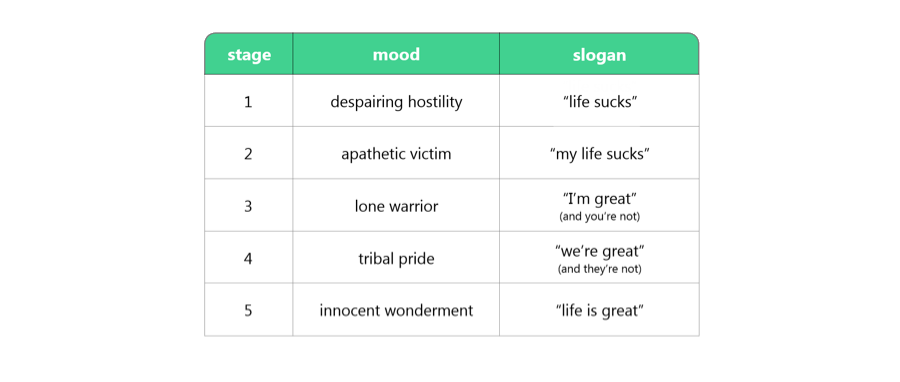As an American, you probably value individualism — independence and self-reliance.
You think that, with enough hard work, you can make your fortune in the world. You devour books about personal productivity, hoping it’ll make you more efficient and effective… and therefore happier and more successful.
But is individualism really a predictor of success?
tribes & language
In Tribal Leadership, Dave Logan, John King, and Halee Fischer-Wright argue that although we might think of ourselves an individuals, humans actually tend to form “tribes.” Tribes are groups of 20-150 people with a shared purpose or association. A tribe can be family, a student class, or a company.
A tribe uses language to define themselves and set their norms. If you listen carefully to the words they use, you can determine how their members feel about themselves, the group, and the world. A good “tribal leader” knows how to use this language to leverage their group towards higher functioning, greater happiness, and success. “Change the language in the tribe, and you have changed the tribe itself.”
Now we get to the fun systems-thinking part!
Tribes naturally fall into one of five stages. You can determine a tribe’s stage by listening to the language its members use.
stage 1
The members of a Stage 1 tribe feel “despairing hostility.” They’re miserable, oppressed, and ready to revolt. If they had a slogan, it would be would be “life sucks.” Most companies would never hire a Stage 1 employee, and an Stage 1 company would quickly go out of business. It’s so bad, if someone brought a gun to work, you wouldn’t even be surprised.
Only about 2% of companies have a dominant Stage 1 culture.
stage 2
The members of a Stage 2 tribe feel like “apathetic victims.” They think they’ve seen it all before and watched it all fail. They’re judgmental and sarcastic in meetings, but don’t offer ideas for improvement. They feel put-upon by upper-management, and their coffee mugs say, “I live for the weekend.” If they had a slogan, it would be “my life sucks.”
About 25% of companies have a dominant Stage 2 culture.
stage 3
The members of a Stage 3 tribe feel like “lone warriors.” They work hard, do their best, and try to get ahead. They complain they don’t have enough time or support. They’re slogan is “I’m great,” which naturally implies, “and you’re not.” They’re hyper-focused on time management and personal productivity because they fear they can’t rely on others. In Stage 3, information is power, so tribe members try to hoard information, sharing it only on an “as needed” basis.
From an early age, we’re instructed to function within Stage 3. American individualism (manifested in both schools and companies) encourages us to work alone to achieve our goals — a gold star or a higher paycheck. As the saying goes, “If you want to go fast, go alone.”
Most professionals spend their careers in and out of Stage 3, and about 49% of companies have a dominant Stage 3 culture.
stage 4
The members of a Stage 4 tribe feel “tribal pride.” They know they’re a part of something bigger than themselves. They’re happy to bump into other tribe members, excited about collaborating. They’re genuine and inspired at work. If you took the tribe away, the members’ sense of self would suffer. Stage 4’s slogan is “we’re great,” which naturally implies, “and they’re not.” A Stage 4 tribe feels great, part, because they’re better than their competitors.
About 22% of companies have a dominant Stage 4 culture.
stage 5
The members of a Stage 5 tribe feel “innocent wonderment.” They strive to make a global impact and marvel at their sense of infinite potential. Their goal is to make history, rather than to beat a competitor. Their slogan would be “life is great.” Stage 5 — as wonderful as it is — is unstable; so they will naturally revert to Stage 4 over time.
Only about 2% of companies have a dominant Stage 5 culture.
leadership
Let me guess: you want to move your tribe closer to Stage 5, right?
But how?
Tribal Leadership argues that you can become a tribal leader — someone who facilitates a new dominant culture — by using language and relationships. For instance…
language
Speak the languages of both the current stage and the desired stage. For instance, sympathize with a colleague by saying, “It sounds like you’re lacking support” (Stage 3 language), and suggest, “Let’s collaborate to relieve the burden” (Stage 4 language).
Don’t use language to try to “fake it ’til you make it.” In other words, don’t slap good words on top of a bad culture, expecting that to make it better. If your company is in Stage 3, don’t use Stage 4 buzz words (like “mission,” “vision,” and “community”), hoping it will transform your culture. Your colleagues will know the truth and their work will continue to reflect the Stage 3 reality.
Don’t label others (or yourself) as a certain stage. Telling a colleague that they are “so Stage 3” will put them in a psychological box that’s hard to break. Instead, label theirs, your own, and your group’s behavior and language — making it easier to analyze objectively.
relationships
Encourage triads (three-person relationships) instead of dyads (two-person relationships). Stage 3 (“I’m great”) is the land of dyads. Members think that information is power, so they gather and hoard information by having countless two-person conversations. They take pride in viewing themselves as the hub between the spokes. However, members of Stage 4 (“we’re great”) and Stage 5 (“life is great”) tribes know that relationships and collaboration are the keys to success. So they shun two-person conversations — they would rather bring a third person into the mix, getting an alternate perspective and encouraging a new relationship. They’re not afraid of promoting a connection between the two people they’ve introduced, since they know it will benefit the tribe as a whole.
Recognize how physical space can supersede language to reflect the true nature of a tribe’s relationships. For instance, if your company abolishes position titles, calling everyone “associate” to promote a non-hierarchical (Stage 4) culture, but they still give some employees a fancy corner offices, then the physical space will speak the unspoken: this is still a Stage 3 culture.
the take-away
By thinking of the world in terms of systems, you can clarify and concretize things (like corporate culture and office politics) that previously seemed too messy or intangible to dissect.
With a system in place (like a chart of tribal stages), you have a framework on which to hang the nuance of your experiences, assumptions, and desires.
A system doesn’t remove this nuance, but rather gives it the context it needs to be truly helpful to you.
———————
Action items:
〉 Listen carefully to the language your tribe uses. What slogan does it most closely reflect?
〉 Using the tips above (and more found in Tribal Leadership), use language and relationships to shift your tribe up one stage.
〉 Don’t go it alone! You can only move forward by bringing others with you. Communicate openly and honestly with your group. Remember, tribal strength is an unending — and ever-rewarding — process.

